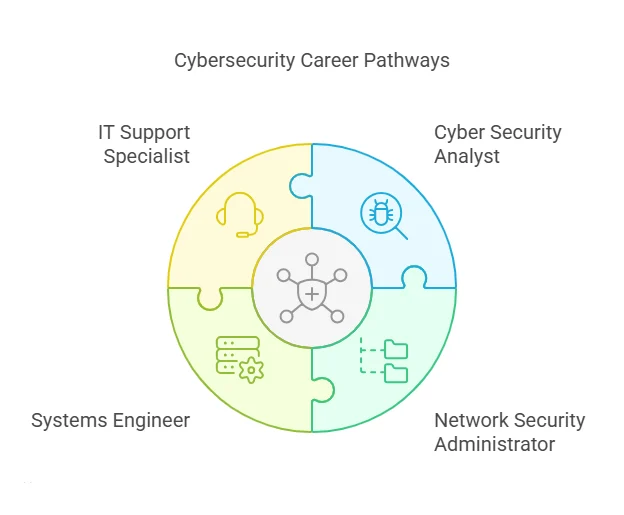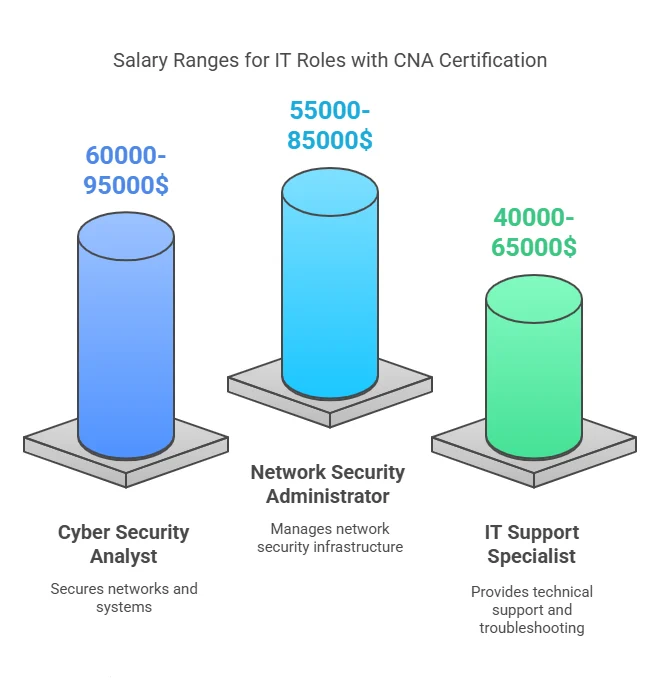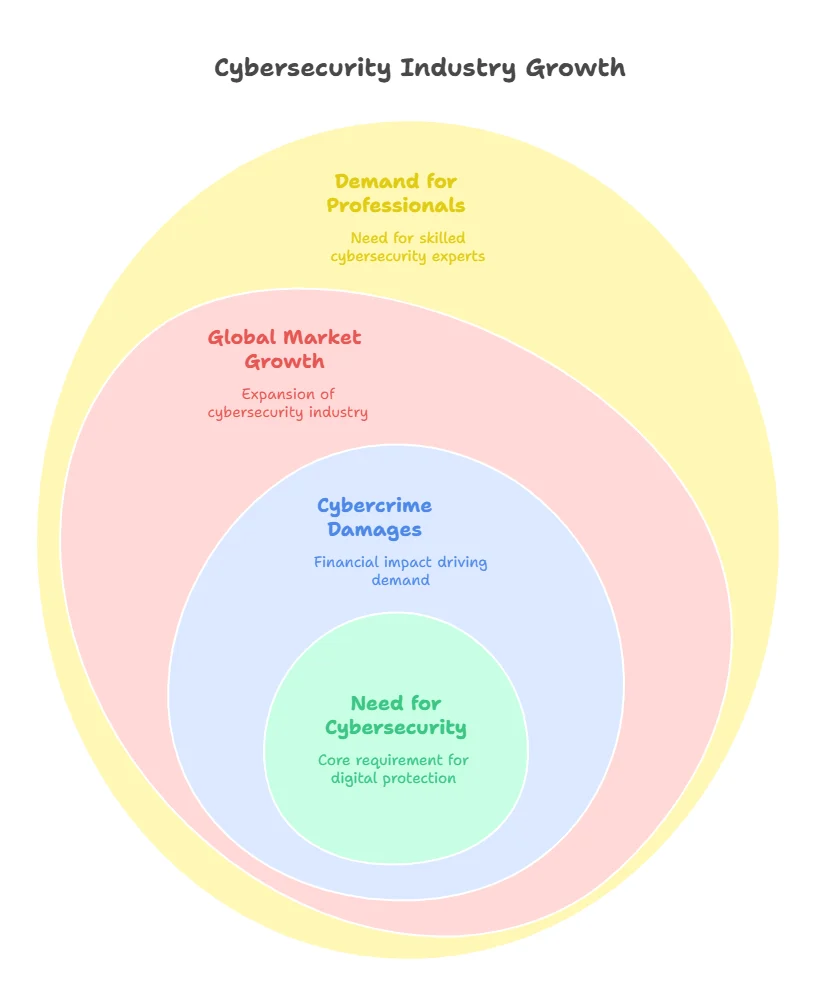In today’s rapidly advancing technological landscape, cybersecurity is one of the most critical fields, as businesses and organizations increasingly rely on digital platforms to operate. Whether you’re looking to dive into the world of cybersecurity or expand your existing knowledge, certifications play a significant role in advancing your career. One such certification that has gained attention is the CNA (Certified Network Associate) certification. But is it worth pursuing? In this blog, we’ll dive deep into what CNA certification entails and explore its impact on your cybersecurity career.
Related Blog: How to Get CNA Certification in Cyber Security: A Step-by-Step Guide
Overview of CNA Certification
The CNA (Certified Network Associate) certification is a foundational credential primarily awarded to professionals who seek to prove their expertise in networking and security-related tasks. Offered by various accredited institutions, including CompTIA, the CNA focuses on essential network and cybersecurity skills that form the bedrock of advanced certifications.
This certification is typically aimed at individuals who want to pursue roles such as network administrators, system engineers, and IT specialists. CNA programs cover essential topics like network architecture, security protocols, firewall configurations, and network troubleshooting, making it an essential stepping stone in the cybersecurity domain.
Increased Career Opportunities
One of the most significant advantages of obtaining a CNA certification is the access it provides to a broader range of career opportunities in the cybersecurity sector. With the explosion of cyber threats and the increasing reliance on digital infrastructure, the demand for skilled cybersecurity professionals has never been higher.
Key Career Roles for CNA Certification Holders:
- Cyber Security Analyst: As a cyber security analyst, your primary responsibility will be to protect an organization’s networks from cyber-attacks. A CNA certification provides the foundational knowledge needed to detect and respond to security incidents.
- Network Security Administrator: In this role, you will be responsible for configuring and managing firewalls, VPNs, and security protocols. A CNA certification offers the necessary skills to secure a network against potential vulnerabilities.
- Systems Engineer: Systems engineers who have CNA certifications often oversee an organization’s IT infrastructure, including ensuring that security protocols and network configurations are optimized for protection.
- IT Support Specialist: IT support professionals are often the first line of defense in resolving security-related issues and troubleshooting network problems. A CNA certification proves beneficial in securing these roles.
By earning the CNA certification, you open up doors to these and many more positions in the field, enhancing your chances of securing a role in the thriving cybersecurity sector.

Salary Boost
The financial benefits of obtaining CNA certification can be substantial. As organizations continue to prioritize the security of their networks and systems, professionals with certifications are in high demand, which often translates into higher salaries.
Average Pay Ranges:
- Cyber Security Analyst: According to industry salary data, professionals in this role can expect to earn between $60,000 and $95,000 annually, with certified individuals at the higher end of the scale.
- Network Security Administrator: Network security administrators with CNA certification can command salaries ranging from $55,000 to $85,000 per year, depending on experience and job location.
- IT Support Specialist: For those pursuing roles as IT support specialists, the salary range tends to vary from $40,000 to $65,000 annually, with certified professionals earning at the top end.
The salary boost is a significant motivating factor for many individuals considering the CNA certification, as it directly enhances earning potential. This increase is particularly notable when compared to non-certified professionals in similar roles.
Related Blog: How CNA Certification Can Boost Your Cyber Security Career and Salary Potential

Job Security
Cybersecurity has emerged as one of the most secure industries, with demand for skilled professionals expected to grow exponentially in the coming years. By earning a CNA certification, professionals demonstrate their commitment to keeping up with evolving technologies and best practices in network security.
The certification offers job security in several ways:
- Skill validation: Employers value certifications as they serve as proof that you have the requisite skills to protect their network from evolving cyber threats.
- Industry demand: As cyber threats increase in both scale and sophistication, organizations need professionals who are capable of securing their IT infrastructure. Having a CNA certification positions you as a trusted professional in this high-demand industry.
- Opportunities for growth: With ongoing advancements in technology, certified professionals are more likely to be retained and promoted due to their specialized knowledge and technical skills.
Thus, CNA certification can significantly improve your job security, providing you with the stability needed to grow and thrive in your career.

Industry Demand
The cybersecurity industry is expanding at a rapid rate due to the increasing frequency of cyber-attacks and the critical need for data protection. The demand for certified professionals is at an all-time high, and this trend is only expected to continue as businesses increase their digital footprint.
- Rising threats: According to cybersecurity reports, cybercrime damages are predicted to reach $10.5 trillion annually by 2025, further emphasizing the need for qualified cybersecurity professionals.
- Global growth: The cybersecurity industry’s global market is anticipated to grow by 14.4% annually, underscoring the growing need for experts equipped to protect digital infrastructure.
Obtaining a CNA certification helps individuals stay relevant in an ever-evolving job market, ensuring they are equipped to handle new challenges as the demand for cybersecurity services grows.

Comparison with Other Certifications
While CNA certification is valuable for beginners and professionals looking to enter the field, it’s important to consider how it compares to other well-known certifications in the cybersecurity sector, such as CompTIA Security+ and CISSP (Certified Information Systems Security Professional).
- CNA vs. CompTIA Security+: While both certifications are foundational, CompTIA Security+ focuses more specifically on cybersecurity topics, whereas CNA has a broader scope covering networking and system administration.
- CNA vs. CISSP: CISSP is a more advanced certification, typically pursued by experienced professionals. It covers a broader spectrum of security domains, while CNA is ideal for those looking to focus on network security and foundational knowledge.
While CNA offers a great entry point into the field, professionals looking to specialize in cybersecurity management and advanced systems may consider pursuing additional certifications such as CISSP for career advancement.

Personal and Professional Growth
Obtaining CNA certification isn’t just about increasing your job prospects and salary—it also plays a crucial role in your personal and professional development.
- Skill development: CNA certification deepens your understanding of core network and cybersecurity concepts, which are vital for troubleshooting network issues and improving system security.
- Career advancement: A CNA certification can act as a stepping stone to more advanced certifications and roles, helping you climb the career ladder in the cybersecurity industry.
- Confidence: Successfully earning CNA certification boosts your confidence, proving to yourself and potential employers that you are capable of handling complex network security tasks.
By pursuing CNA certification, you invest in both your professional growth and your future in the cybersecurity field.

Conclusion: Weighing the Pros and Cons of Obtaining CNA Certification
While the CNA certification offers many benefits, such as career opportunities, salary boosts, and job security, it’s essential to weigh both the pros and cons before making a decision. For those just starting in the cybersecurity field, CNA certification is an excellent foundational step that opens up a wide range of job roles and provides valuable technical skills. However, professionals looking to advance in more specialized areas may eventually need to pursue additional certifications like CompTIA Security+ or CISSP.
Ultimately, the value of CNA certification lies in its ability to equip professionals with the knowledge and skills necessary to secure networks and systems in an increasingly digital world. For those looking to enter or advance in the cybersecurity industry, CNA certification is undoubtedly a valuable credential.
ACSMI provides comprehensive certification programs for aspiring cybersecurity professionals, helping them advance their careers and secure high-demand roles in the ever-growing industry.
FAQs
- What is CNA certification?
CNA certification is a credential that validates an individual’s expertise in networking and network security, preparing them for various roles in the IT and cybersecurity industries.
- How long does it take to get CNA certification?
The time it takes to earn CNA certification depends on your prior knowledge and experience. Generally, it can take anywhere from a few weeks to several months to complete the necessary coursework and pass the certification exam.
- Is CNA certification recognized globally?
Yes, CNA certification is recognized worldwide, making it a valuable asset for cybersecurity professionals regardless of their location.
- What is the salary difference between certified and non-certified professionals?
Certified professionals typically earn higher salaries. For example, a certified cybersecurity analyst can earn up to 20% more than their non-certified counterparts.
- Can CNA certification help with job security?
Yes, as the demand for cybersecurity professionals continues to rise, having CNA certification can significantly improve job security by demonstrating your expertise and commitment to the field.

Leave a Reply